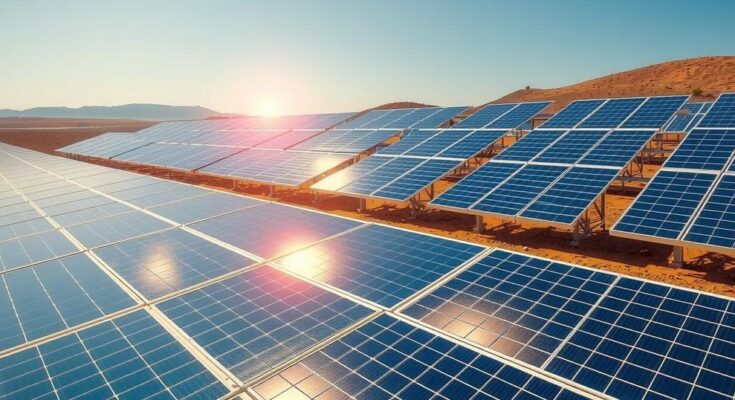Tunisia has signed contracts for four solar projects totaling 500 MW, contributing about 5% of the country’s electricity supply. These projects form part of a larger 1.7 GW tender expected to be operational by 2027. Qair International, Scatec, and Voltalia are key developers, also involving upcoming wind projects to enhance renewable capacity.
Tunisia has recently formalized contracts for four solar photovoltaic projects totaling a significant capacity of 500 megawatts (MW), which marks a notable advancement in its efforts towards expanding renewable energy resources. This initiative is part of an overarching plan, beginning with a 1.7 gigawatt (GW) tender, set to become operational by 2027. The projects are projected to generate around 1 terawatt-hour (TWh) of electricity annually, which is anticipated to constitute approximately 5% of the nation’s electricity supply.
The successful bids which have emerged from this competitive process include three separate 100 MW solar installations, to be constructed by renowned companies Qair International, Scatec, and Voltalia, with locations designated in El Ksar (Gafsa), Mezzouna (Sidi Bouzid), and Menzel Habib (Gabes). Additionally, Qair International has further secured a project of 198 MW capacity in Sidi Bouzid, thereby increasing its footprint in Tunisia’s renewable energy sector.
Moreover, Tunisia’s Ministry of Industry, Mines, and Energy has unveiled intentions to initiate bidding for two wind projects in the coming years, each with a capacity of 75 MW, expected to commence by March 2025. The country has already commenced two 10 MW solar projects in the Kasserine Governorate, which are being developed by Qair and Mazarine. Furthermore, a significant 50 MW solar facility in Tozeur, amounting to TND 135 million, is underway, developed collaboratively by Scatec and Toyota subsidiary Aeolus.
Through these innovative projects, Tunisia is steadfastly advancing towards its renewable energy objectives, thereby reaffirming its commitment to becoming a significant contributor to the regional energy transition.
Tunisia is actively pursuing ambitious renewable energy initiatives aimed at reducing its reliance on fossil fuels and enhancing sustainability. The country’s strategic focus on solar energy is indicative of a broader global trend towards adopting renewable sources to address energy demands and mitigate climate change impacts. The establishment of solar photovoltaic projects is a pivotal step in fulfilling Tunisia’s energy goals, as it seeks to significantly increase its renewable energy production by 2030. The recent contracts signify both national commitment and international collaboration in achieving these targets.
In summary, Tunisia’s recent signing of contracts for 500 MW of solar projects demonstrates a significant leap towards sustainable energy expansion. The integration of these renewable resources is expected to substantially enhance the nation’s electricity supply while contributing to larger international efforts to combat climate change. Additionally, the upcoming wind projects further illustrate Tunisia’s strategic approach in diversifying its energy portfolio, thus solidifying its role in the regional energy transition.
Original Source: solarquarter.com




